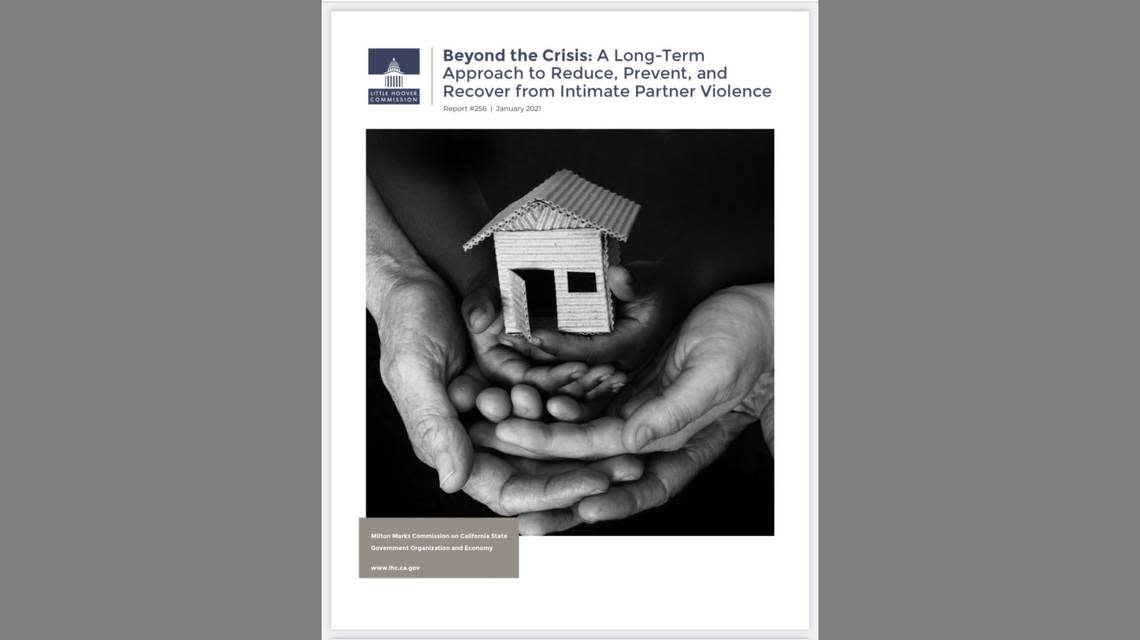Efforts to curb domestic violence in California lack of strategy, leadership, commission says

Domestic violence all too often explodes outside of California’s homes, resulting in the deaths of not only people in those households but also law enforcement and collateral victims.
State leaders could prevent these tragedies, the Little Hoover Commission stated in a report released Friday titled “Beyond the Crisis: A Long-Term Approach to Reduce, Prevent, and Recover from Intimate Partner Violence.”
Domestic violence now is treated as a family issue, but Little Hoover’s staff recommended in this report that state leaders adopt a strategic statewide plan for early intervention that is based on accurate data.
“Greater action must be taken to ensure California responds rigorously and effectively to this abhorrent abuse,” Little Hoover Commission Chair Pedro Nava stated in a letter published with the report. “The commission recommends the state transition to a holistic, strategic, evidence-based, and collaborative approach that helps Californians reduce, prevent, and recover from intimate partner violence.”
Domestic violence has “profoundly harmful” effects on all Californians, commission staff pointed out in this report and in a prior report in May, citing data from law enforcement, news analyses, public agencies and numerous published academic studies.
From 2010 to 2016, 40% of law enforcement officers who died did so as a result of a injuries suffered in response to domestic violence calls, according to the U.S. Department of Justice.
An analysis by Bloomberg News found that 60% of mass shootings are committed by men who are trying to kill their partner or who have a history of domestic violence.
Women in the United States are 21 times more likely to be shot to death than women living in other wealthy nations, according to a 2014 study published in the American Journal of Public Health, and in most cases, it is their intimate partners who kill them.
Besides the risk of death, there are financial costs to state residents that come as a result of these crimes, including expenses for property damage, police response and investigations, courts, jails, prisons and other services.
Researchers at the University of Colorado School of Public Health and the University of Miami Miller School of Medicine in Florida concluded that each murder costs about $9 million and each case of non-sexual assault about $107,000.
“Law enforcement agencies in California field an average of 457 domestic violence calls per day,” the Little Hoover staff noted in the May report. “Looking at just one facet of domestic violence, sexual violence — 51% of female rape victims are raped by a current or former partner — the California Coalition Against Sexual Assault estimates it costs California taxpayers $2.9 billion each year.”
Even as legislators pass laws to help check this public health crisis, agencies, victims, their batterers, law enforcement and others meet with significant challenges as a result of a lack of coordination. Those include:
▪ An inability for batterers to find mandated classes that fit their working-class job schedules and class fees that cause an economic hardship to providing for their families.
▪ Bureaucratic red tape that has nonprofits in the domestic violence world spending hundreds of hours annually filing virtually the same information to multiple agencies in order to get funding. That funding, however, cannot go toward the time spent on these tasks.
▪ A long list of addresses from which state law enforcement must remove weapons but a dearth of the officers needed to do so. Because the state does not pay competitive wages, potential law enforcement recruits go elsewhere for work.
For these and other reasons, the Little Hoover Commission also urged state leaders to appoint a leader who can coordinate among agencies and take responsibility for executing a strategy that emphasizes early intervention rather than crisis responses.
That strategy must include a way for survivors to attain economic security after fleeing abusive relationships, Little Hoover staff said. As The Bee noted in December, many men and women find themselves unable to get jobs or to get credit because their partners have ruined their financial record.
“Although numerous state agencies have an impact on those affected by intimate partner violence, the commission found that California lacks a coordinated, cohesive strategy to prevent this abuse and support survivors with their long-term needs,” Nava wrote in his letter to lawmakers and Gov. Gavin Newsom. “The state’s current approach is siloed and suffers from critical gaps in services and funding that make it difficult for survivors to access the resources they need to escape their abuser and establish a life on their own.”

